Ivory Coast
Many are calling it the best-ever Africa Cup of Nations. The 34th edition of the biennial soccer tournament served up more goals, plenty of late drama, and surprising twists and turns as underdogs had their day.
It finished with a happy ending for host nation Ivory Coast after its remarkable path to the final, including near-elimination in the group stage.
The Elephants defeated Nigeria 2-1 in Sunday's final in the 60,000-capacity Alassane Ouattara Stadium to set off unbridled celebrations across the country. It affirmed locals' belief that God was helping the team.
Associated Press photographers were there from the start to the finish to capture all the drama, pride and passion.
The supporters helped create a vibrant spectacle with ceaseless dancing to drumbeats and vocal support. Many painted themselves in their countries' bright colours, others wore costumes, and a festival feeling developed among rival fans.
The same could not be said of accredited media at the tournament. The Confederation of African Football condemned journalists' "unbecoming and unprofessional" behaviour after several fights among media around games and inappropriate celebrations in the media tribune.
Few could have imagined Ivory Coast reaching the final after a humiliating 4-0 loss to Equatorial Guinea left it on the brink of elimination. But doubtful results in other groups favoured the home team. Ghana's late collapse — conceding two goals in injury time to Mozambique — and a subsequent win for Morocco over Zambia meant Ivory Coast squeezed into the knockout round.
It prompted the Ivorian soccer federation, which had already fired its coach, to look for another, but it failed to "borrow" the France women's team's coach for the rest of the tournament.
Ivory Coast's interim coach Emerse Faé did not let his federation's clear lack of confidence affect him as he quietly prepared the team for the knockout round. And so the country's scarcely believable run began.
Nigeria's progress was much more straightforward as Super Eagles coach José Peseiro banked on defence for success. Nigeria did not concede a goal in four games straight after an opening 1-1 draw with Equatorial Guinea, and goalkeeper Stanley Nwabali was the hero with two saves in the penalty shootout win over South Africa in the semifinal.
Nigeria star Victor Osimhen, the African player of the year, only scored one goal. The Napoli forward was unlucky to have three ruled out over the tournament, and his inspirational performances helped his team to the final.
Equatorial Guinea forward Emilio Nsue finished the tournament as top scorer with five goals. Nsue is a 34-year-old right-back for a third-division team in Spain.
It wasn't the only surprise.
Seven-time champion Egypt flopped as it failed to win a game despite sacrificing a cow.
Defending champion Senegal was knocked out by Ivory Coast in the round of 16.
Five-time winner Cameroon, four-time champion Ghana, and former winners Algeria and Tunisia were all knocked out before the quarterfinal stage, which had a fresh-looking lineup compared to the last edition.
None of the eight quarterfinalists from the previous Africa Cup in Cameroon — Burkina Faso, Tunisia, Senegal, Equatorial Guinea, Gambia, Cameroon, Egypt and Morocco — made it to the last eight this time.
Congo made to the semifinals despite only winning one game in regular time. The Congolese players drew attention to the humanitarian crisis in eastern Congo with a gesture before their semifinal against Ivory Coast.
South Africa also made it to the final four by upsetting World Cup semifinalist Morocco on the way. Bafana Bafana goalkeeper Ronwen Williams followed up with four penalty saves in a shootout win over Cape Verde in the quarterfinals.
The tournament was tough on the men in charge. Egypt coach Rui Vitória, Ivory Coast coach Jean-Louis Gasset and Ghana coach Chris Hughton were all fired. The Tanzania coach was suspended after one game, the Gambia coach resigned, the Senegal coach was hospitalized, the Tunisia coach's contract ended, and Burkina Faso had a coaching vacancy.
The futures of Cameroon coach Rigobert Song and Algeria coach Djamel Belmadi remain uncertain. Algerian Football Federation president Wali Sadi said he agreed to end Belmadi's contract, but Belmadi was reportedly unhappy with that announcement and is yet to finalize his departure.
Samuel Eto'o, president of the Cameroon Football Federation, offered his resignation if other members followed suit. They declined.



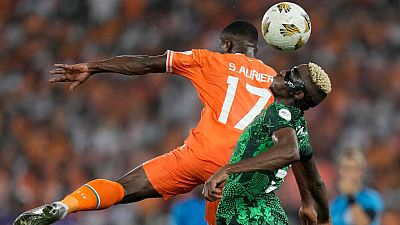

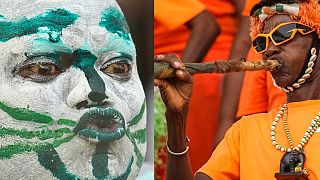
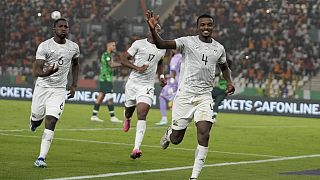
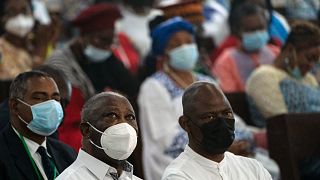
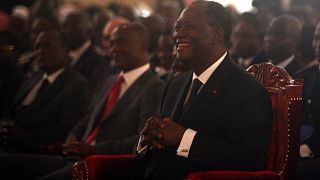
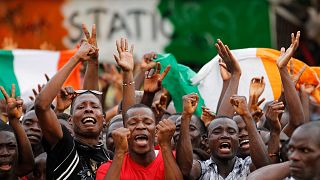



Go to video
Ruto's $9M mega church sparks outrage amid Kenya's crisis
Go to video
“I can’t do nuttin’ for ya man”, Nigerian Minister quotes Flavour Flav in rejection of Trump policy
Go to video
U.S. slashes visa duration for some African nationals amid policy shift
Go to video
Nigeria snubbed at White House summit, opposition blames Tinubu
Go to video
Ghana cracks down on gold smuggling with new multi-agency task force
02:05
WAFCON: Super Falcons fans optimistic about the team's performance